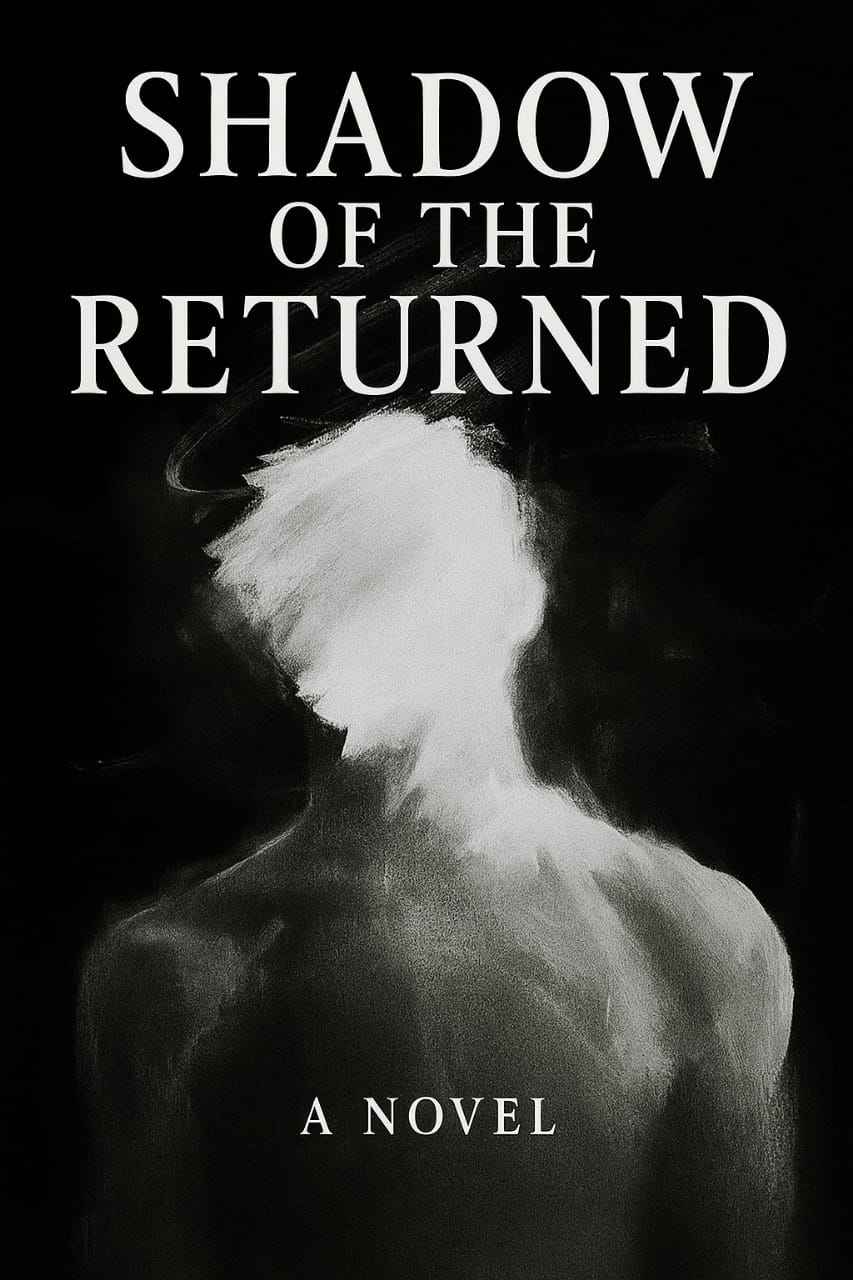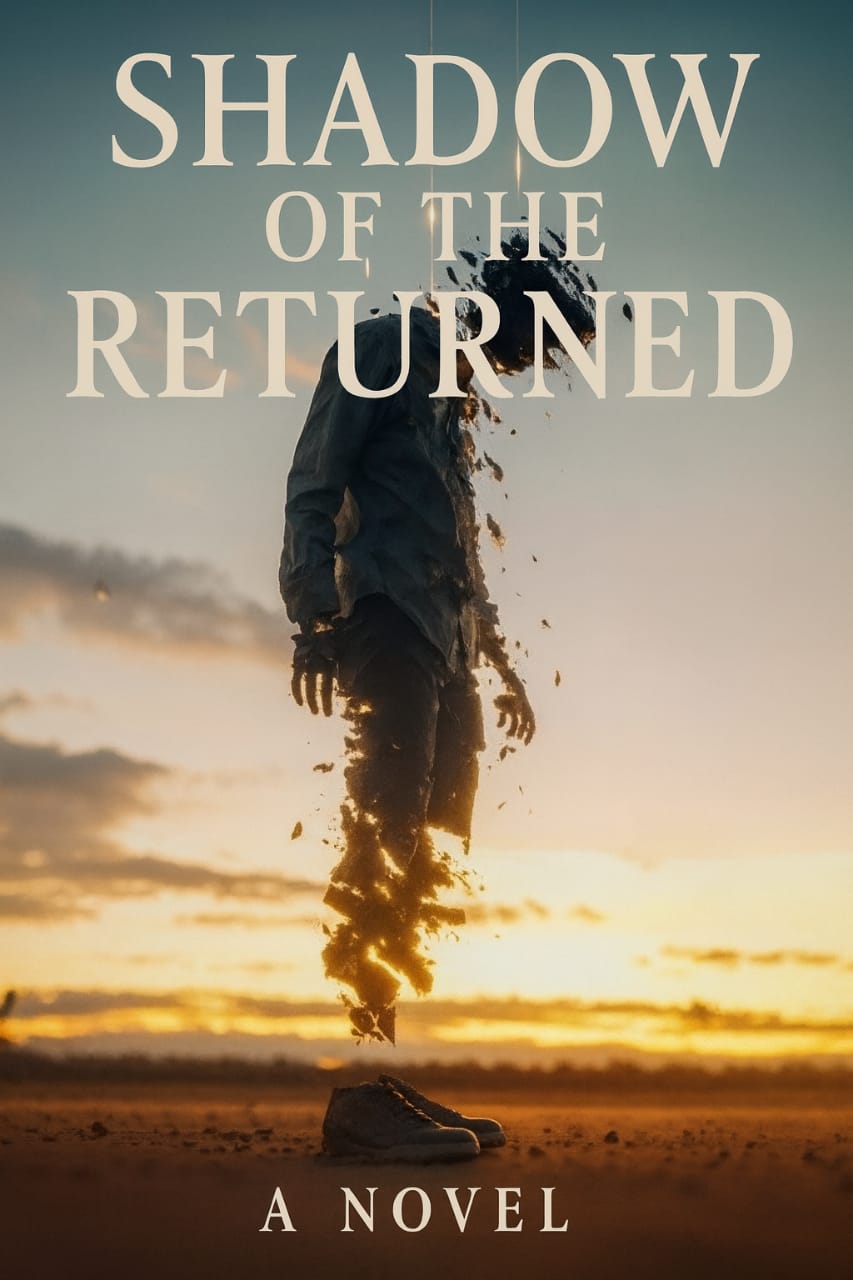Shadow of the Returned Chapter 2: The Morning Bell
The first sound was not a bell but the ache of metal remembering how to ring. It began as a moan somewhere beyond the tents, a long complaint pulled out of rust, and by the time it reached Ashen’s ears it had become almost beautiful.
He woke before he understood he was waking. The body knows danger better than the mind ever will. For a moment he didn’t move, only let the cold air outline him — canvas above, dirt below, the smell of wet rope and boiled roots in between. Someone nearby coughed, a tired, small sound, followed by the hiss of fire and the scrape of a spoon against tin.
Morning. Real morning.
He opened his eyes.
The camp looked different in daylight. Less like a hiding place, more like what it really was — a fragile compromise with ruin. Half the tents were patched with fabric that had once been advertisements; the slogans still peeked through, promising comfort that had long since turned to mold. A few children ran between the lines, quiet even in their play. Their shadows trailed behind them like old habits.
His shadow, as always, didn’t quite agree with the light. It stretched the wrong way, defying the angle of the sun. When he shifted, it lagged a fraction too long before catching up.
He pulled his coat tighter and stepped outside.
The woman from the night before was standing by a cookfire, ladling something grey and steaming into metal bowls. She saw him, hesitated only a breath, and gestured toward the pot. “Eat before it cools,” she said.
He nodded, wordless, and joined her. The smell was earthy, sharp — boiled mushrooms, maybe, or something pretending to be them.
“You slept.”
“I tried.”
“That’s more than most manage.” She handed him a bowl and leaned back against a broken crate. “I’m Mira.”
He remembered her face in the lantern light: calm, but too still to be comfortable. Now, under the sun, she looked older and younger at once. The kind of person who had learned to ration her hope carefully.
“Ashen,” he said.
Her eyebrows rose slightly. “The old word. Means fire, doesn’t it?”
“Means what’s left after.”
She smiled faintly. “Poetic.”
He didn’t answer. The stew was hot enough to burn but he ate anyway. Hunger doesn’t wait for comfort.
Around them, the camp came alive in quiet rhythms — people mending nets, sorting scrap, a child carrying water from a drum. Every face carried that same look of practiced endurance.
Mira watched him over the rim of her cup. “You came from the city.”
“Yes.”
“How bad?”
He thought of the fountain, the tapping hand, the shadows under the street. He thought of the patrol’s voices on the radio, of the word seed.
“Bad enough,” he said.
She didn’t press. “We don’t go that far in anymore. The zones shift. Sometimes the whole block’s gone by morning.”
“Gone how?”
Her gaze moved to the east, where the skyline was a row of broken teeth against the light. “Folded. Like paper burned from the corner. You wake up and it’s just… less world.”
He listened, the spoon cooling in his hand. “And you stay here.”
“It’s the last ground that still grows things.” She gestured at a patch of green beyond the tents — thin, stubborn shoots clinging to the dirt. “If we move north, the air burns your lungs. South, the rivers run black. Here, we can still pretend to live.”
Pretend. The word fit too well.
He looked at the people again — the way they spoke softly, the way their shadows seemed to hesitate before following. The Nightmare hadn’t just followed him back. It had taken root everywhere.
Mira poured another cup and sat beside him. “You said you’re Returned.”
He nodded.
Her expression didn’t change, but the air between them did. The conversation around the fire dimmed slightly, as if the others were listening without wanting to.
“You’re not the first we’ve seen,” she said. “Most don’t last long.”
“What happens to them?”
“They burn out. Or disappear. Sometimes the Watch gets them.”
“The Dominion.”
She glanced sharply. “You know that name?”
“I met their hunters.”
“Then you’re lucky to still be breathing.”
He remembered the masks, the measured steps. “Who are they, really?”
“Once, they were the army. When the cities fell, they called themselves protectors. Now they’re just collectors. They gather what’s left of the old world — power, weapons, people. Especially the Returned.”
“Why?”
“Because you’re dangerous.”
Ashen looked down at his hands. The skin around his knuckles was still faintly marked by the glow of the Sovereign’s chains. “They’re not wrong.”
“No,” Mira said softly. “But they’re worse.”
The bell sounded again, clearer this time — a rusted tower somewhere near the northern wall. The camp began to move, people taking their places as if the sound dictated their breaths. Mira stood, brushed the dirt from her coat, and gestured for him to follow.
“Come on. You’ll want to see the wall.”
He followed her through the maze of tents and shacks until the ground sloped upward. The wall wasn’t stone or metal. It was an old train line, collapsed and reinforced with scavenged girders, its flanks strung with barbed wire and hanging talismans made from machine parts and bones. Beyond it stretched a plain of grey mist. The sun stopped at its edge like it didn’t want to go farther.
“That’s the boundary,” Mira said. “Everything past that used to be the outer districts. Now it’s Zone Three.”
The mist shifted, and for a moment Ashen saw something move within it — a shape too tall, too thin, walking like a thought that didn’t know it had a body.
“People go in?” he asked.
“Sometimes. Looking for medicine. For family.” She paused. “They don’t come back.”
He felt his shadow stir, a twitch under his feet. The mist seemed to notice.
“You shouldn’t be this close,” she said quietly.
“I’ve been closer.”
“That’s what I’m afraid of.”
He turned to her. “You think it’s me. That I brought it.”
Mira met his eyes. “I think you survived it. And that might be the same thing.”
For a long moment they stood in the grey light, the camp murmuring behind them, the mist breathing ahead. Somewhere in the distance, something roared — low, far away, but growing.
People near the wall began shouting, running for cover.
“What is it?” he asked.
Mira’s face tightened. “A breach.”
From the mist, shapes began to emerge — not monsters in the way nightmares draw them, but silhouettes of people, moving wrong. Each shadow bled into the next, a tide of black water spilling toward the wall.
Ashen felt the pull before he heard the first scream. His own shadow stretched forward, eager, trembling with recognition.
He clenched his fists, forcing it down, but the hunger rose like a second heartbeat.
Mira drew a weapon from her belt — a curved blade etched with runes that glimmered faintly blue. “If you can fight,” she said, “do it. If you can’t, stay behind me.”
He almost laughed.
The first of the shadows hit the wall, pouring through the gaps like smoke. The air turned cold enough to hurt.
Ashen stepped forward.
The light around him bent, and for the first time since returning, he let the darkness breathe. His shadow rose, unfurling behind him like a banner of night.
The nearest wraith recoiled — too late.
When his fist struck, the world folded for a heartbeat, and the creature imploded into silence.
The others hesitated, sensing something older in him than fear.
Mira looked over her shoulder, eyes wide in something between awe and warning. “What are you?”
Ashen didn’t answer. He couldn’t.
He could feel the Nightmare inside him again, whispering, familiar and cold.
Not gone. Never gone.
He raised his hand. The shadow obeyed.
And the battle for the wall began.



